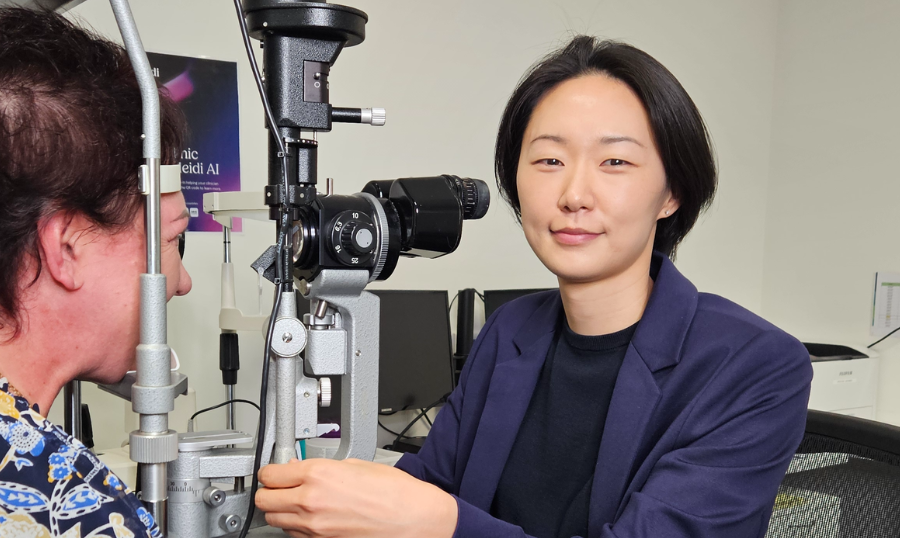Auckland Eye Welcomes Cornea and Anterior Segment Specialist Dr Bia Kim
Auckland Eye is pleased to welcome Dr Bia Kim, a highly trained Cornea and Anterior Segment Specialist, to our team.

Do you suffer from dry, itchy, red eyes? If so, you are not alone. During the spring and autumn, countless New Zealanders experience either seasonal allergies or Dry Eye Syndrome. Since red, watery eyes are the hallmark of both allergies and Dry Eye, sometimes it’s hard to tell the difference. For a long time, scientists thought of these conditions as separate, but since the prevalence of both conditions peak during certain months of the year, it turns out they may have something in common: the seasons.
The most notable marker of the fall season is the vibrant red and orange falling leaves on the ground. Over time, these beautiful leaves gradually break down and turn into rotting vegetation. As the vegetation starts to decompose, this can cause mould and the release of fungal spores into the atmosphere, which many people are sensitive to. This triggers allergy symptoms in many people.
While many people suffer from eye allergies in the fall, seasonal Dry Eye syndrome is also a common condition that is suffered by many people around the world during the autumn months. The reason for this is because…
As the leaves change colour and autumn quickly approaches, the temperature fluctuates from warm to cool —which means that due to central indoor heating, the air gets drier indoors. This lower indoor humidity combined with computer screen use in an office environment or an increase in staying indoors watching television at home can often lead to inflammation and eye discomfort. Looking at digital screens for extended periods of time can result in a reduction in blinking. Due to this reduced blink rate, more tears will evaporate from the surface of the eye which often causes Dry Eye symptoms. These symptoms include watering, reduced vision, sensitivity to bright light and red, sore eyes.
If you suffer from sore, watery eyes at this time of year, how do you know if you have Dry Eye syndrome or Autumn allergies? While both allergies and Dry Eye Syndrome have similar symptoms and both can be brought on by environmental causes (such as pollution, pollen, mould spores or pet dander), the tell-tale sign of allergies is itchiness. When the eyes are sensitive to an allergen, histamine is released causing the eyes to itch, tear and redden. Additionally, if your itchy eyes are combined with sneezing, a runny or blocked nose and watery eyes, it is a likely sign that autumn allergies is the underlying problem.
Depending upon which condition is affecting your eyes (allergies or Dry Eye Syndrome), the treatment will vary…
Allergies: Since seasonal allergies are such a common phenomenon for many people, there are many non-prescription medications available. For seasonal allergies, various eye drops can often be quite effective to relieve itchiness, redness and watery eyes. If your allergy symptoms are relatively severe and over-the-counter eye drops are ineffective at providing relief, you may need your eye doctor to prescribe a stronger medication. Prescription medications to reduce the histamines in the eyes and provide symptom relief include antihistamines, decongestants, non-steroidal anti-inflammatory drugs and steroids (for the more acute allergy symptoms).
Note: If you suffer from seasonal allergies, you can also take action to reduce your flare-ups by wearing wraparound glasses when you are outdoors to shield your eyes from the stimulus (pollen and other airborne allergens). Additionally, because the surface of contact lenses can accumulate airborne allergens, you may want to consider removing your contacts and only wearing eyeglasses during the allergy season.
Dry Eye: One of the main causes of Dry Eye is Meibomian Gland Dysfunction (MGD). MGD is a blockage of your meibomian gland so they don’t secrete enough oil into the tears. Since the tears the evaporate too quickly, MGD is associated with Dry Eye Syndrome; often resulting in discomfort and eye irritation.

Despite the connection between seasonal allergies and Dry Eye Syndrome, a correct diagnosis is essential. If you would like more advice on how to curb seasonal dry eye symptoms and would like to find the underlying cause of your dry red and irritated eyes, book an appointment at Auckland Eye and call 0800 25 53 93. After a thorough eye exam, your ophthalmologist may determine whether your eye concerns result from seasonal allergies or Dry Eye disease.
However, if you have already been diagnosed with Dry Eye Syndrome and are seeking effective relief from a premium provider, book an appointment at Oasis Dry Eye Spa.
At Oasis Spa you will receive a full clinical evaluation carried out by our expertly trained Dry Eye consultants. During your comprehensive assessment, we will measure the quality of your tears and the health of your meibomian glands to determine the reason for your Dry Eye and provide you with a tailored treatment plan. Throughout your tailored treatment plan, you will have access to proven state-of-the-art dry eye technology including LipiFlow and Lumenis Optima IPL.
Our Dry Eye experts are here to help you find the treatment option that is best and most effective for you. For more information or to book an appointment at Oasis Dry Eye Spa, contact us on oasisspa@aucklandeye.co.nz or 0800 25 53 93.

Auckland Eye is pleased to welcome Dr Bia Kim, a highly trained Cornea and Anterior Segment Specialist, to our team.

Discover how Auckland Eye is redefining inclusive healthcare by launching New Zealand’s first assistive website toolbar.

Macular degeneration is a leading cause of vision loss in older adults. There’s no cure, but its progression can be slowed. Here’s what to know.